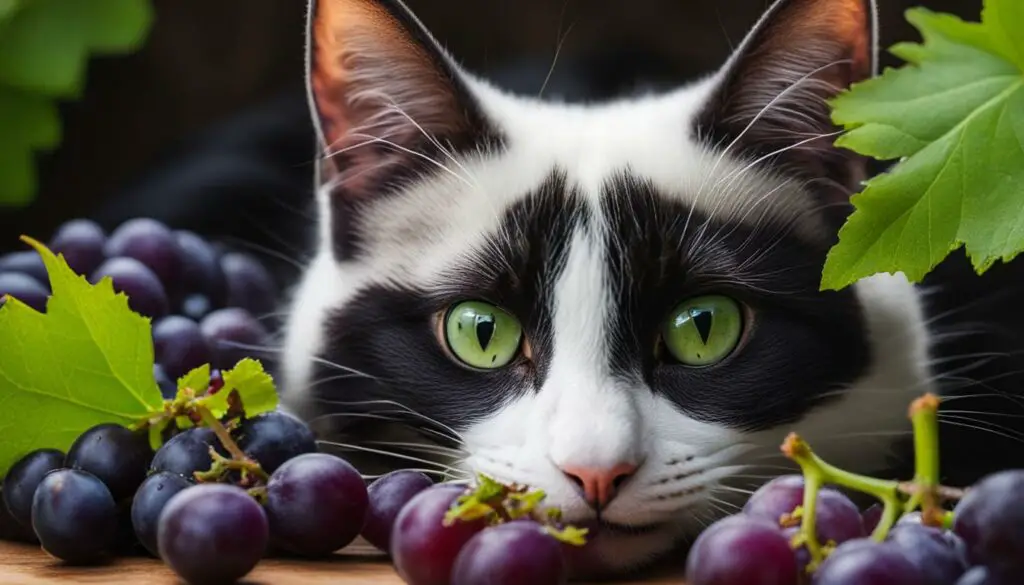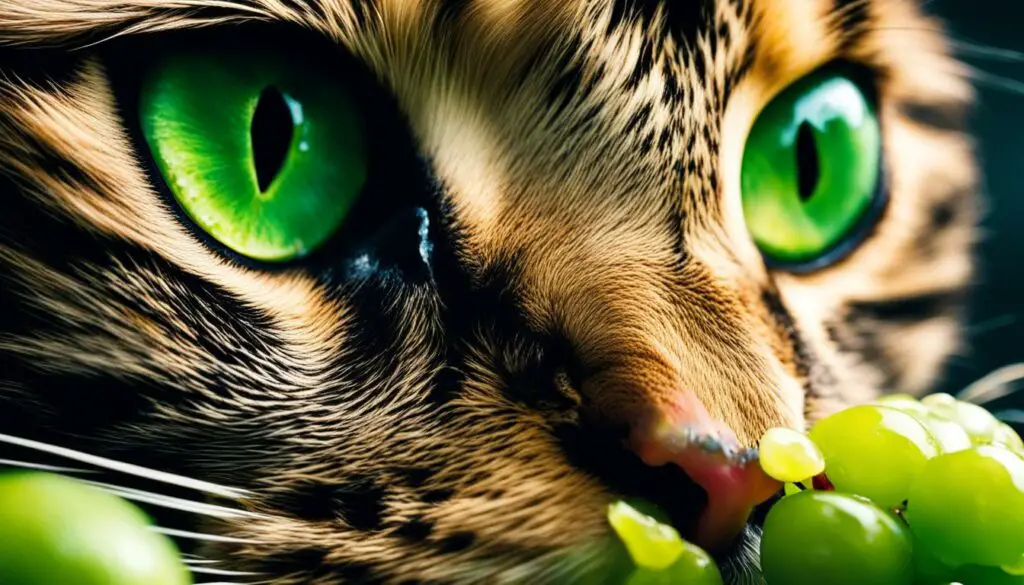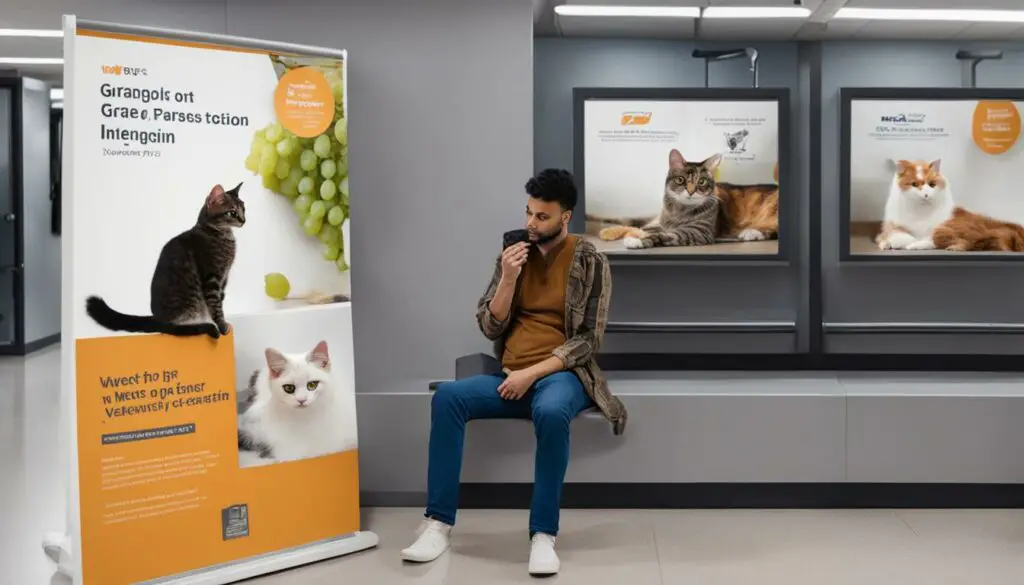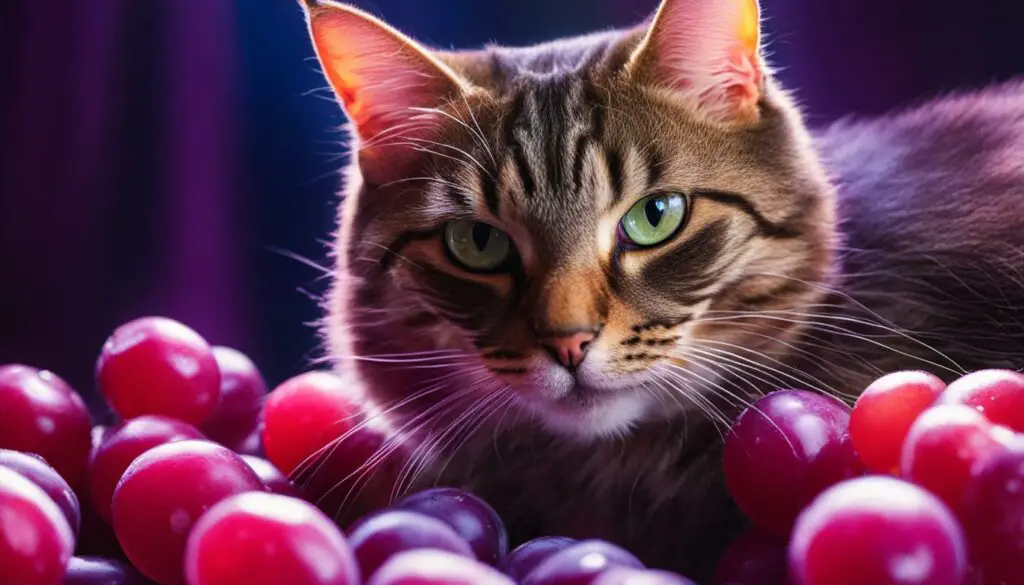Grapes and raisins are delicious treats for us humans, but did you know that they can be extremely toxic to cats? If your furry friend has accidentally licked or eaten a grape, it’s important to understand the potential consequences and take appropriate action to ensure their health and well-being.
While it may seem harmless, even a small amount of grape ingestion can lead to severe health issues in cats, including kidney failure, vomiting, and diarrhea. The exact reason behind grape toxicity in cats is still unknown, but it is believed to be related to a toxin called tannins or an unknown compound present in grapes.
If you suspect that your cat has consumed grapes or raisins, it is crucial to contact a veterinarian immediately. Prompt treatment can help prevent complications and potentially save your cat’s life. In severe cases, hospitalization may be necessary to provide the necessary care and support.
Remember, not all cats will have the same reaction to grapes. Some may display symptoms of grape toxicity, while others may not show any signs at all. It’s important to monitor your cat for any changes in behavior, energy level, appetite, or physical appearance. If you notice anything unusual, seeking veterinary attention is essential.
To keep your cat safe, it’s important to educate yourself about foods that are potentially harmful to them. Grapes and raisins are not the only culprits. Other foods to avoid giving your cat include onions, garlic, chocolate, caffeine, alcohol, and avocado. Being aware of these dangers will help you provide the best care for your feline companion.
Key Takeaways:
- Ingesting grapes or raisins can be extremely toxic to cats, leading to kidney failure and other severe health issues.
- If your cat has consumed grapes, contact a veterinarian immediately for prompt treatment.
- Monitor your cat for any signs of grape toxicity, such as vomiting, diarrhea, or lethargy.
- Keep grapes and other toxic foods away from your cat to prevent any potential harm.
- Consult with your veterinarian for professional guidance and advice on cat health risks associated with grapes.
Why Grapes Are Toxic to Cats
While grapes may be a tasty and healthy snack for humans, they can be incredibly dangerous for our feline friends. Grapes, both fresh and dried as raisins, are toxic to cats. Even a small amount can have severe consequences on their health. But what exactly makes grapes toxic to cats?
Research suggests that the exact reason behind grape toxicity in cats is still unknown. It is believed that a toxin called tannins or an as-yet-unidentified compound present in grapes is harmful to felines. These substances can cause damage to the kidneys, leading to acute kidney failure. This can have potentially life-threatening consequences for cats.
Cats should avoid grapes altogether to prevent any harm to their health. It’s important to be vigilant about keeping grapes out of your cat’s reach and to educate family members and guests about the dangers of grapes for cats. By doing so, you can help ensure the safety and well-being of your beloved feline companion.

Dangers of Grape Toxicity in Cats:
| Dangers of Grape Toxicity | Symptoms |
|---|---|
| Kidney failure | Vomiting |
| Dehydration | Diarrhea |
| Loss of appetite | Lethargy |
| Increased thirst |
“Even a small amount of grapes can cause acute kidney failure in cats.”
As seen in the table above, grape toxicity in cats can lead to various symptoms, including vomiting, diarrhea, lethargy, and increased thirst. These symptoms can manifest within a few hours or up to 24 hours after ingestion. If you suspect that your cat has ingested grapes or is showing any signs of grape toxicity, it is crucial to seek immediate veterinary attention for proper evaluation and treatment.
Symptoms of Grape Toxicity in Cats
When it comes to grape toxicity in cats, being aware of the symptoms is crucial for early detection and prompt treatment. Cats can display various signs of grape toxicity, which can range from mild to severe. Here are some common symptoms to look out for:
- Vomiting
- Diarrhea
- Lethargy
- Loss of appetite
- Dehydration
- Increased thirst
These symptoms may occur within a few hours or up to 24 hours after grape ingestion. It’s important to note that not all cats will exhibit the same symptoms, and the severity can vary based on factors such as the cat’s overall health, age, and the amount of grapes consumed.
If you notice any of these symptoms in your cat and suspect grape ingestion, it’s crucial to seek veterinary attention immediately. A veterinarian will be able to evaluate your cat’s condition, provide the necessary treatment, and help prevent any further complications.
| Symptoms of Grape Toxicity in Cats | Description |
|---|---|
| Vomiting | Cats may experience recurrent vomiting after ingesting grapes. |
| Diarrhea | Abnormal bowel movements characterized by loose or watery stool. |
| Lethargy | Decreased energy levels and overall weakness in cats. |
| Loss of appetite | Cats may lose interest in food and refuse to eat. |
| Dehydration | Insufficient fluid levels in the body, leading to dry gums and sunken eyes. |
| Increased thirst | Cats may display excessive thirst and consume more water than usual. |
By staying vigilant and recognizing the symptoms of grape toxicity in cats, you can take the necessary steps to ensure the well-being of your feline companion.
Monitoring Your Cat for Signs of Illness
As responsible cat owners, it’s crucial to monitor our feline friends for any signs of illness, especially if they have ingested grapes or are at risk of grape toxicity. Cats cannot communicate when something is wrong, so it’s up to us to be vigilant and attentive to their well-being.
One important aspect of monitoring our cats is observing changes in their behavior. If your cat becomes lethargic, withdrawn, or exhibits unusual aggression, it may be a sign that something is amiss. Changes in energy levels and mood can often be early indicators of illness.
Another vital aspect of monitoring your cat is paying attention to their appetite and weight. If your cat suddenly loses interest in food or experiences a significant change in weight, it could be a red flag for potential health issues. Similarly, any lumps or changes in coat texture should be noted and brought to the attention of a veterinarian.
In addition to behavior and physical appearance, it’s also crucial to monitor your cat’s bathroom habits. Changes in urine or stool can be an indication of an underlying health problem. Keep an eye out for any unusual color, consistency, or odor.
| Symptoms to Monitor: | What to Look for: |
|---|---|
| Vomiting and Diarrhea | Monitor the frequency and consistency of vomit or stool |
| Increased Thirst and Dehydration | Monitor water intake and check for signs of dehydration, such as sunken eyes or dry gums |
| Lethargy and Loss of Appetite | Observe changes in activity levels and food consumption |
Remember, if you suspect your cat has ingested grapes or shows any signs of illness, it’s important to seek veterinary attention immediately. Early intervention can make a significant difference in the outcome for your cat’s health. Regular check-ups and open communication with your veterinarian are essential in maintaining your cat’s well-being.
Not All Cats Will Have the Same Reaction to Grapes
When it comes to grape toxicity in cats, it’s important to understand that not all felines will have the same reaction. Individual sensitivity, breed susceptibility, and the amount ingested can all contribute to varying responses. While some cats may not show any symptoms after licking or ingesting grapes, others may experience severe illness. Persian cats, for example, are known to be more vulnerable to grape toxicity than other breeds.
To highlight the differences in cat reactions to grapes, I’ve prepared a table summarizing different scenarios:
| Cat | Reaction to Grapes |
|---|---|
| Tom | No symptoms observed after licking a grape |
| Luna | Vomiting and diarrhea after ingesting a small amount of grapes |
| Oscar | Severe kidney failure and hospitalization required after consuming a large quantity of grapes |
As the table shows, the reaction can vary greatly from cat to cat, and it’s crucial for cat owners to be aware of their pet’s individual sensitivities. Monitoring your cat’s behavior and seeking immediate veterinary attention if any symptoms arise is always the best course of action to ensure their well-being.
Foods that are Potentially Toxic to Cats
Cats have sensitive digestive systems, and there are several foods that can be toxic to them. It’s important for cat owners to be aware of these foods to keep their furry friends safe and healthy. In addition to grapes and raisins, here are some other foods that can be harmful to cats:
Onions and Garlic:
Onions and garlic contain compounds that can damage a cat’s red blood cells, leading to anemia. Even small amounts of these ingredients, such as those found in gravies or baby food, can be dangerous for cats.
Chocolate:
Chocolate contains a substance called theobromine, which is toxic to cats. It can cause symptoms such as vomiting, diarrhea, rapid breathing, and increased heart rate. Dark chocolate and unsweetened baking chocolate are particularly dangerous.
Caffeine:
Caffeine, found in coffee, tea, energy drinks, and certain medications, can be toxic to cats. It can cause symptoms such as restlessness, increased heart rate, muscle tremors, and in severe cases, seizures.
Alcohol:
Alcohol can have a much stronger effect on cats than on humans. Even small amounts of alcohol can cause symptoms such as vomiting, disorientation, lack of coordination, and in severe cases, coma or death.
Avocado:
Avocado contains a substance called persin, which can be toxic to cats. It can cause symptoms such as vomiting, diarrhea, difficulty breathing, and in severe cases, fluid accumulation around the heart.
It’s important to never feed these foods to your cat, and to ensure they do not have access to them. If you suspect your cat has ingested any of these toxic foods, contact your veterinarian immediately for advice and potential treatment.

What to Do if Your Cat Has Licked a Grape
If your cat has licked a grape, it’s important to take immediate action to ensure their safety and well-being. Follow these steps to address the situation:
- Remove any remaining grapes: Check your cat’s surroundings and remove any grapes or raisins within their reach. This will prevent further ingestion and reduce the risk of complications.
- Monitor your cat: Keep a close eye on your cat for any signs of illness or discomfort. Look out for symptoms such as vomiting, diarrhea, lethargy, or loss of appetite. If you notice any of these symptoms, it’s crucial to seek veterinary attention.
- Offer plenty of water: Provide your cat with fresh water to drink. This will help flush out any potential toxins and keep them hydrated.
- Consider inducing vomiting (under veterinary guidance): If your cat has ingested a significant amount of grapes or raisins, your veterinarian may recommend inducing vomiting to remove the toxins from their system. It’s important to consult with a professional before attempting this at home.
- Seek veterinary care if necessary: If your cat shows any signs of grape toxicity or you’re unsure about the severity of the situation, it’s best to seek immediate veterinary care. A professional can evaluate your cat’s condition and provide appropriate treatment.
Remember, grapes are toxic to cats, and even a small amount can cause serious health issues. It’s crucial to take quick action and consult with a veterinarian to ensure your cat’s safety and well-being.

| Step | Action |
|---|---|
| 1 | Remove any remaining grapes or raisins from your cat’s reach |
| 2 | Monitor your cat for signs of illness |
| 3 | Provide fresh water for hydration |
| 4 | Consider inducing vomiting under veterinary guidance |
| 5 | Seek veterinary care if necessary |
Consulting with Your Veterinarian
If your cat has ingested grapes or you suspect they have, it is crucial to consult with your veterinarian promptly. They are the best resource for professional guidance and can provide a proper evaluation of your cat’s health. Veterinarians have the knowledge and expertise to handle cases of grape ingestion or toxicity in cats.
During your consultation, the veterinarian will assess your cat’s condition and may recommend specific tests or treatments depending on the severity of the situation. They will also be able to diagnose any potential health issues and determine the appropriate course of action. Seeking veterinary help is essential to ensure your cat receives the necessary care and to prevent any further complications.
If you’re unsure whether your cat has consumed grapes or if you notice any signs of grape toxicity, such as vomiting, diarrhea, or lethargy, it’s important not to delay in contacting your veterinarian. Time is of the essence when it comes to treating grape ingestion in cats, and early intervention can make a significant difference in your cat’s recovery.
Remember, your veterinarian is there to support you and your cat’s well-being. By consulting with them, you can receive personalized advice tailored to your cat’s needs, ensuring the best possible outcome.

Prevention Tips for Keeping Grapes Away from Cats
As responsible pet owners, it is crucial to take proactive measures to prevent grape ingestion in cats. By implementing the following prevention tips, you can ensure the safety and well-being of your feline companion:
- Store grapes properly: Keep grapes and raisins securely stored in a designated area that is inaccessible to your cat. Store them in closed containers or cabinets to prevent accidental access. Remember, even a small amount of grapes can be harmful to your cat’s health.
- Mindful eating habits: When enjoying grapes as a snack, be cautious and keep them away from your cat’s reach. Cats are curious creatures, and they may try to sneak a taste if your guard is down. Always be attentive to your surroundings when eating grapes to avoid any potential accidents.
- Educate family members and guests: Ensure that family members and guests are aware of the dangers of grapes for cats. Educate them about the potential risks and the importance of not offering grapes or leaving them within reach of your feline friend. Awareness is the key to preventing accidental grape ingestion.
- Check pet food ingredients: Read the labels of your cat’s food carefully to ensure that it does not contain any grapes or grape-derived ingredients. Opt for reputable brands and consult your veterinarian if you have any doubts about the safety of a particular product.
- Avoid grape-containing plants: Be cautious when choosing indoor or outdoor plants, as some may produce grapes or grape-like berries that can pose a risk to your cat. If you have grapes or grape-containing plants in your home or garden, make sure they are placed in areas that are inaccessible to your feline companion.
By following these prevention tips, you can create a grape-free environment for your cat, minimizing the risk of grape ingestion and potential health complications. Remember, prevention is the best way to keep your furry friend safe and healthy.
Table: Foods to Avoid Giving Your Cat
| Food | Danger |
|---|---|
| Onions | Can cause anemia and damage red blood cells. |
| Garlic | Similar to onions, it can cause anemia and damage red blood cells. |
| Chocolate | Contains theobromine, which is toxic to cats and can cause various health issues. |
| Caffeine | Stimulants like caffeine can be toxic to cats and affect their central nervous system. |
| Alcohol | Even small amounts can be dangerous and cause liver damage or alcohol poisoning. |
| Avocado | Contains a substance called persin, which is toxic to cats and can cause gastrointestinal issues. |
It is crucial to be aware that grapes and raisins are not the only foods that can be harmful to cats. By being mindful of potential dangers and taking preventive measures, you can create a safe environment for your beloved feline companion.
Conclusion
In conclusion, it is crucial to be aware of the potential dangers of grape ingestion in cats. If your cat has licked a grape or consumed any amount of grapes, immediate action is necessary. Grapes are toxic to cats and can lead to severe health issues, including kidney failure.
If you suspect that your cat has ingested grapes, it is important to seek veterinary attention right away. A veterinarian can provide a proper evaluation and recommend the necessary treatment. Remember, time is of the essence when it comes to grape toxicity in cats.
Prevention is key in keeping your beloved feline safe from the consequences of eating grapes. Store grapes properly, keep them out of your cat’s reach, and educate family members and guests about the dangers. It is also essential to check pet food ingredients and keep plants containing grapes away from your cat’s environment.
By being proactive and vigilant, you can help protect your cat from the potential harm associated with grape ingestion. Always prioritize your cat’s health and well-being, and take the necessary steps to keep them safe from the hazards of grapes.
FAQ
What happens when my cat licked a grape?
Cats can experience severe health issues if they ingest grapes or raisins, even in small amounts. This can lead to kidney failure, vomiting, diarrhea, and other complications. It is important to contact a veterinarian immediately for treatment and to prevent further complications.
Why are grapes toxic to cats?
The exact reason grapes are toxic to cats is unknown, but it is believed to be due to a toxin called tannins or an unknown compound. Even a small amount of grapes can cause acute kidney failure in cats.
What are the symptoms of grape toxicity in cats?
Common symptoms of grape toxicity in cats include vomiting, diarrhea, lethargy, loss of appetite, dehydration, and increased thirst. These symptoms can occur within a few hours or up to 24 hours after ingestion.
How can I monitor my cat for signs of illness?
It is important to observe changes in behavior, energy level, appetite, mood, urine or stool, and physical appearance in your cat. If any signs of illness or ingestion of something toxic are suspected, it is best to seek veterinary help.
Will all cats have the same reaction to grapes?
Cats may have different reactions to grapes due to individual sensitivity, breed susceptibility, and the amount ingested. Some cats may not show any symptoms, while others may experience severe illness. Persian cats, for example, are more vulnerable to grape toxicity.
Are there other foods that are toxic to cats?
Yes, there are several other foods that can be toxic to cats, including onions, garlic, chocolate, caffeine, alcohol, and avocado. These foods can cause various health issues and organ damage.
What should I do if my cat has licked a grape?
If your cat has licked a grape, remove any remaining grapes or raisins from their reach. Monitor your cat for signs of illness like vomiting, diarrhea, lethargy, or loss of appetite. Provide them with water and seek veterinary care if necessary.
Should I consult with a veterinarian if my cat has ingested grapes?
Yes, it is important to consult with your veterinarian if your cat has ingested grapes or shows any signs of grape toxicity. They can provide professional guidance, diagnose any potential health issues, and recommend the appropriate treatment.
How can I prevent grape ingestion in cats?
To prevent grape ingestion in cats, store grapes properly, be mindful when eating grapes and keep them out of your cat’s reach, educate family members and guests about the dangers of grapes for cats, check pet food ingredients to ensure they do not contain grapes, and keep plants containing grapes away from your cat’s environment.
What is the importance of understanding the dangers of grapes for cats?
It is important to understand the dangers of grapes for cats to take immediate action if your cat has licked a grape or consumed any amount of grapes. Grapes are toxic to cats and can cause severe health issues, including kidney failure.








